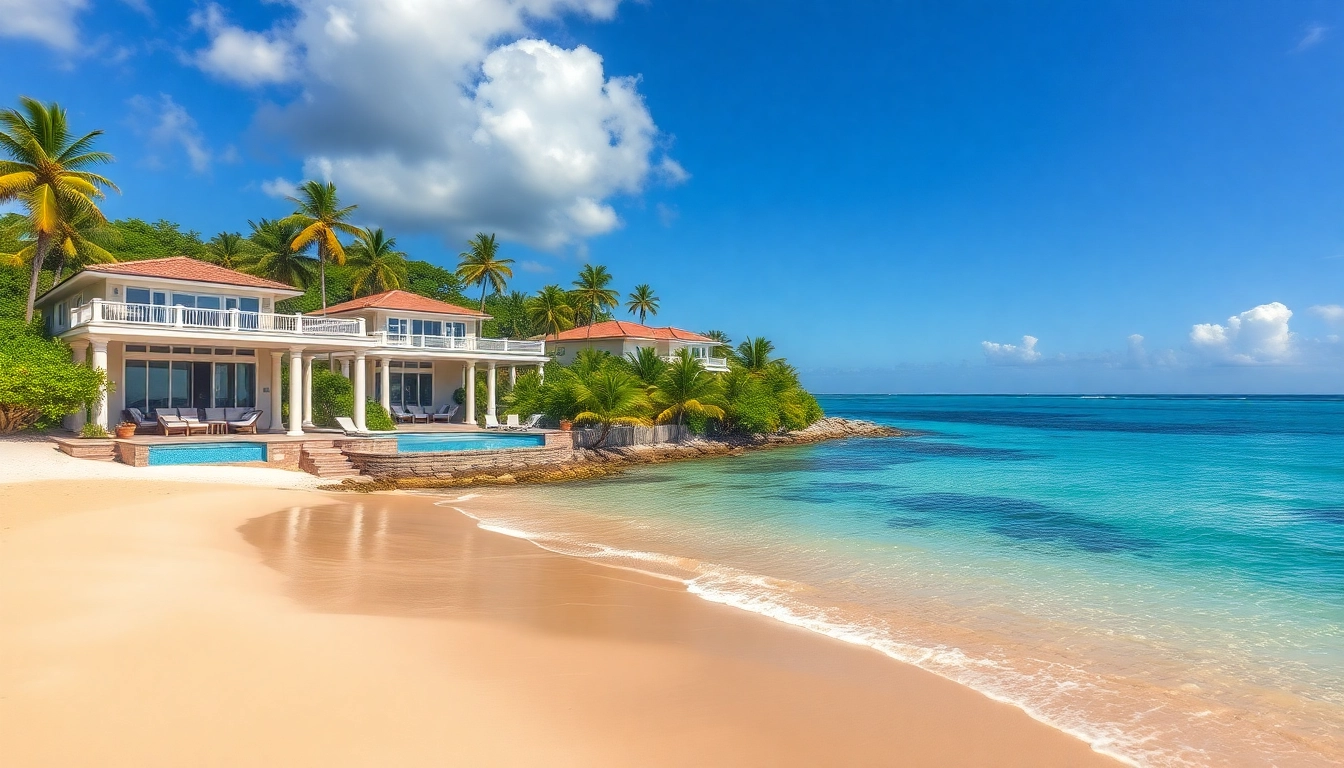Jamaica, a beautiful island in the Caribbean, has long been a coveted destination for tourists and investors alike. With its stunning landscapes, vibrant culture, and warm climate, it’s no wonder that jamaica real estate is booming. This article will delve deep into the various facets of the Jamaican real estate market, exploring its growth, types of properties, the buying process, financing options, and tips for choosing the right real estate agent. By the end of this guide, you’ll have a comprehensive understanding of the Jamaican real estate landscape, making you better equipped to navigate your property investment journey.
Understanding the Jamaica Real Estate Market
The Growth of Real Estate Investments
The Jamaica real estate market has witnessed substantial growth over the last decade, fueled by both local and foreign investments. As tourism continues to thrive, the demand for rental properties has surged, particularly in tourist hotspots like Montego Bay and Negril. This growth is not merely a ripple; rather, it indicates a solid wave of investment interest robust enough to attract various stakeholders.
Factors driving this growth include favorable government policies, an increase in infrastructure development, and the continual rise of digital platforms that enhance property finding and buying experiences. Notable real estate developers are investing in high-end resorts, residential communities, and commercial spaces, further expanding the market’s footprint.
Key Regions for Property Development
While real estate opportunities abound across Jamaica, specific regions stand out as hotspots for property investment. These include:
- Montego Bay: Known for its vibrant nightlife and stunning beaches, Montego Bay consistently ranks at the top of the list for property investors.
- Kingston: The capital city offers a unique blend of urban living and cultural richness, with numerous residential and commercial properties available.
- Ocho Rios: Famous for its beautiful beaches and natural attractions, Ocho Rios is a favorite among tourists, making it an ideal location for investment in rental properties.
- Negril: With its famous seven-mile beach, Negril attracts a large number of vacationers, creating numerous opportunities for real estate investments.
Market Trends and Forecasts for 2024
As we look toward 2024, several trends in the Jamaica real estate market are becoming evident. The first is the shift toward sustainable and eco-friendly properties. Investors are showing a preference for developments that emphasize green building practices, which cater to environmentally conscious buyers. Additionally, technology integration in real estate transactions is expected to increase. Virtual tours, blockchain for property transactions, and enhanced online listings will transform how properties are bought and sold.
Furthermore, as the global economy gradually stabilizes post-pandemic, more expatriates considering relocation to Jamaica may stimulate demand for diverse property types, from luxury villas to affordable housing.
Types of Jamaica Real Estate Properties
Luxury Homes and Villas
Luxury real estate in Jamaica often seems synonymous with breathtaking ocean views and exquisite amenities. High-net-worth individuals seeking vacation homes, investment properties, or permanent residences are drawn to options, including oceanfront villas, gated communities, and exclusive condominiums. Areas like the Platinum Coast, encompassing parts of Montego Bay and Negril, are particularly appealing due to their proximity to high-end boutiques, gourmet restaurants, and private beaches.
Beachfront and Coastal Properties
Beachfront properties are some of the most sought-after listings in Jamaica. Owning a piece of coastline is a desirable proposition for those looking to invest in vacation rentals or personal retreats. The average price per square foot for beachfront property can vary significantly based on location and demand, but the long-term appreciation potential makes it a worthy investment. Communities like Treasure Beach and Port Antonio boast stunning coastlines and unique offerings, appealing to discerning buyers.
Commercial Real Estate Opportunities
The commercial real estate sector in Jamaica is expanding alongside tourism growth. Investors can explore opportunities for retail spaces, office buildings, and mixed-use developments. The rise in e-commerce is facilitating demand for warehousing and logistic solutions across the island. Kingston remains the nexus for commercial investment due to its infrastructural advantages, such as ports and transportation networks, making it an ideal locale for business operations.
Buying Process in Jamaica Real Estate
Legal Considerations for Foreign Buyers
Foreigners can freely purchase property in Jamaica, provided they comply with local laws and regulations. One important legal aspect is that all property transactions must be completed through a licensed and registered attorney. Furthermore, property buyers should ensure that due diligence is conducted, including verifying title deeds and conducting property surveys to avoid potential legal pitfalls.
Essential Steps in the Purchase Process
- Define Your Budget: Understanding your financial limits will help narrow down suitable property options.
- Engage a Real Estate Agent: Partner with a knowledgeable local agent who can guide you through the local market.
- Conduct Property Viewings: Visit several properties to gauge your preferences and integrate local insights.
- Make an Offer: Once you’ve narrowed down your choices, making a formal offer is the next step.
- Complete Due Diligence: Engaging professionals for inspections and title checks is crucial for a smooth closing process.
- Finalize the Purchase: After negotiations and satisfying all conditions, the transaction can officially close.
Understanding Property Taxes and Fees
In addition to the purchase price, buyers should budget for closing costs, which usually fall between 7% and 8% of the property’s value. This includes transfer taxes, legal fees, and other incidental costs. Annual property taxes in Jamaica range from 0.5% to 1.5% of the property’s market value, depending on its use and location. Awareness of these costs is essential to avoid unexpected financial obligations after purchase.
Financing Options for Jamaica Real Estate
Mortgage Availability for Foreign Buyers
Financing a property purchase in Jamaica is dynamic. While local banks offer mortgages to foreign buyers, it’s essential to compare various institutions, as terms can differ significantly. Many lenders require a higher down payment for non-residents, typically around 30-50% of the purchase price, depending on the buyer’s eligibility and creditworthiness. Interest rates can fluctuate based on market conditions, so securing the best rate possible is crucial.
Alternative Financing Solutions
Aside from mortgages, alternative financing options such as seller financing and private lending can be viable. Many sellers today are open to negotiating payment terms to accommodate buyers, which can be advantageous for those without immediate access to substantial funds. Furthermore, engaging with financial advisors or real estate consultants can reveal unique financing opportunities suited to specific situations.
Financial Incentives and Grants
Potential investors should explore financial incentives and grants offered by the Jamaican government aimed at real estate development. Programs focused on granting tax breaks or subsidies for specific sectors, such as eco-friendly housing, can significantly reduce investment costs. Keeping abreast of local financial news can help buyers identify current opportunities.
Choosing the Right Real Estate Agent
Qualities to Look for in a Realtor
Choosing an experienced real estate agent can make a significant difference in the buying process. Look for agents who have a robust track record in Jamaican properties, possess strong negotiation skills, and demonstrate excellent communication practices. Strong agents also have local market expertise, which can provide buyers an edge in competitive markets.
The Importance of Local Market Knowledge
Local market knowledge is critical for any effective real estate agent in Jamaica. They should keep you informed on prevailing trends, typical property values, and mystical local nuances that could affect buying decisions. An agent versed in neighborhood dynamics can offer personalized recommendations based on your lifestyle preferences.
How to Assess Reviews and Recommendations
Before settling on a realtor, it’s wise to look at reviews and testimonials from previous clients. Online platforms like Google reviews, local real estate forums, and social media channels can provide insights into an agent’s professional credibility. Also, don’t hesitate to ask for references or case studies showcasing their successes.



